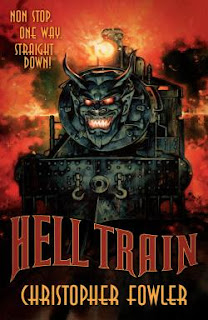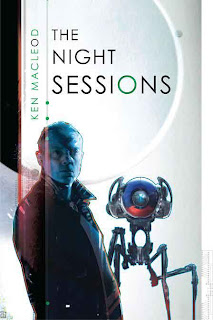

Hell Train: Solaris paperback, January 2012, 319 pages, cover art by Graham Humphreys. Five-time British Fantasy Award winner Christopher Fowler has written some thirty books, most of them horror or mystery. Hell Train got to the semifinals with wins over Greatshadow by James Maxey in the first round and Tempest by Julie Cross in the second round.
After an initial scene in 1966, in which a screenwriter is asked to write a new horror movie for Hammer Films involving a train, the story of Hell Train has settled into a World War I setting. British con artist Nicholas Castleford has persuaded Isabella, an Eastern European beauty, to run away with him, and they have escaped the locals on an ominous train. Also catching the train are an English vicar and his shrewish wife (I can say "shrewish" without fear of being accused of gender bias, since Fowler actually describes her with that word), a fortune-telling countess, and a young man wracked with guilt over his role in the start of the Great War.
The Night Sessions: Pyr trade paperback, April 2012, 261 pages, cover art by Stephan Martiniere. Ken MacLeod is a four-time Hugo nominee among many other honors, and The Night Sessions won the 2009 British Science Fiction Award for best novel. The Night Sessions reached the second round of the Battle of the Books by defeating The Demi-Monde: Winter by Rod Rees in the first round and Simon Bestwick's The Faceless in the second round.
The Night Sessions is set in a future where the bitter "Faith Wars" have turned most folks in the West against organized religion. While much of the first 50 pages followed J.R. Campbell, a Christian fundamentalist from New Zealand, pages 51-100 exclusively track Scottish Detective Inspector Adam Ferguson and his leki assistant (the robot on the cover) as they investigate the murders of two Catholic priests. They collar a suspect, but the clues against the man are so obvious—he delivered the package containing the bomb that killed the first priest, and he was spotted with a rifle in the area where the second priest was shot—that anyone who has read many mysteries must doubt he's the real culprit.
The Battle: These two books are a hoot, and based on the first 100 pages, I strongly recommend them both. Each delivers exactly what it promises to readers. This battle will come down to which book adds an extra unexpected element.
Hell Train is a pitch-perfect literary homage to the Hammer Studios horror films of the 1950s and '60s. I'm not sure yet if Peter Cushing should play the rogue Nicholas, but the train's conductor is all Christopher Lee:
The figure slowly turned to stare at him, as he might peer at an insect. He had a pair of lethal-looking silver clippers in his right hand. 'I am the Conductor of the Arkangel,' he replied in perfect English. He was as pale as ivory. The low timbre of his voice resonated from somewhere deep and far away. Although deeply set in the caves of his skull, his shining black eyes missed no detail.Hell Train isn't all that frightening so far, but the mood of the piece is just right.
'Well, what is our destination?' asked Nicholas sharply.
'That must depend on you.'
'Perhaps you didn't understand the question. Where does the train terminate?'
'We need to stay on board until we cross the border,' asked Isabella. 'Is that possible?'
'You will finally come upon a border, yes.'
Meanwhile, The Night Sessions presents a most interesting future in which there has been a backlash against organized religion. Many science fiction novels assume that society will move away from religion in the future, but fail to consider the turmoil that shift would entail. MacLeod does a wonderful job of showing the uneasy new equilibrium in his secular future. What's more, the murders of two of the remaining Catholic priests suggest that some of the anti-religious forces are just as fanatical and intolerant as any religious fundamentalist. All this is presented in a future with interesting extrapolations of current political and technological trends. Very nice near-future SF from one of the top writers in the field.
So what's the tie-breaking extra element? I absolutely love the artificially intelligent robots in The Night Sessions. Piltdown, the humanoid robot stuck playing an ape-man in a creationist park, was a star of the first 50 pages, and now in the second 50 pages, we start to see the personality of Skulk, Detective Ferguson's tripedal leki assistant, as in this scene where he analyzes some threatening anti-Catholic literature:
". . . Taken together, the broadsides are—to use an old term—a fatwa, a legal ruling by a competent religious scholar. Consequently, if we were to find someone who did accept these premises we would have a prima facie suspect."His robots' dry wit put MacLeod over the top.
"Sometimes," said Ferguson, "I suspect the expression 'No shit, Sherlock' was coined with lekis in mind."
"It was not," said Skulk. "The earliest examples of the usage pre-date—"
"I was joking," Ferguson interrupted.
"So was I," said Skulk. "I appreciate your humour."
THE WINNER: THE NIGHT SESSIONS by Ken MacLeod
The Night Sessions advances to the championship match, where it will face either The Flame Alphabet by Ben Marcus or The Man from Primrose Lane by James Renner.
To see the whole bracket, click here.

No comments:
Post a Comment